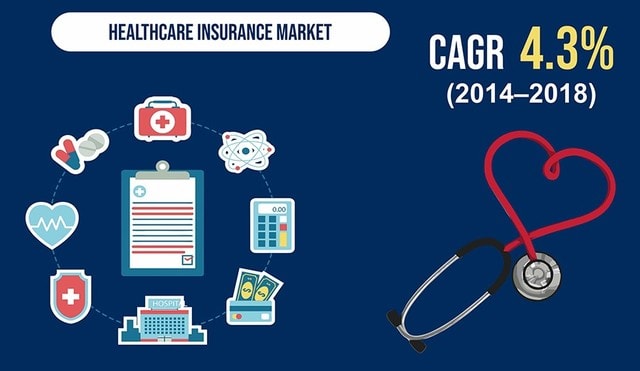The healthcare insurance market size is projected to contribute a revenue of $2.2 trillion by 2024, witnessing a CAGR of 4.3% during the forecast period, according to P&S Intelligence. Increasing prevalence of chronic diseases, rising geriatric population, growing GDP and healthcare expenditure, and high medical costs are driving the progress of the sector. Healthcare insurance is a kind of insurance that covers surgical and medical expenses, which is directly paid to healthcare providers for the treatment of an insured individual. The policy holder can pay the premium monthly or annually on their discretion.

Based on coverage type, the healthcare insurance market is categorized into lifetime and term coverages. Out of these, in 2018, the term coverage category contributed a revenue of $1.3 trillion and is expected to be the faster-growing category, advancing at a CAGR of 4.7% in the analysis period. Term coverage is a fixed-term policy, which provides benefit upon the death of an insured individual. Due to the benefits associated with term coverage, such as low-cost premium and receipt of a lump sum amount when the term ends, the category is predicted to progress.
Now, when segmented by insurer type, minors, adults, and senior citizens are the divisions of the healthcare insurance market. Out of these, insurance plans for adults are anticipated to dominate the market across the globe. In 2018, adults generated a revenue of nearly $0.9 trillion for the market, which is projected to reach $1.2 trillion by 2024. On the other side, the minors category is expected to witness slower growth, advancing at a CAGR of 2.9% in coming years, owing to the fact that minors are dependent on adults and mostly covered in the insurance plans for grown-ups.
Pre-Purchase Inquiry at: https://www.psmarketresearch.com/send-enquiry?enquiry-url=healthcare-insurance-market
Currently, the world is experiencing a significant rise in the geriatric population. In 2017, according to the World Population Prospects report published by the United Nations, geriatric population is predicted to grow faster as compared to the that of other age groups. The report states that there were 962 million people aged 60 years and above in 2017, globally, and this number is estimated to reach 1.4 billion by 2030, 2.1 billion by 2050, and 3.1 billion by 2100. This is further expected to result in the growth of the healthcare insurance market, as more aged people will lead to more plans being sold.
Hence, with the increase in the geriatric population across the globe, the demand for healthcare insurance plans is expected to rise.

Based on coverage type, the healthcare insurance market is categorized into lifetime and term coverages. Out of these, in 2018, the term coverage category contributed a revenue of $1.3 trillion and is expected to be the faster-growing category, advancing at a CAGR of 4.7% in the analysis period. Term coverage is a fixed-term policy, which provides benefit upon the death of an insured individual. Due to the benefits associated with term coverage, such as low-cost premium and receipt of a lump sum amount when the term ends, the category is predicted to progress.
Now, when segmented by insurer type, minors, adults, and senior citizens are the divisions of the healthcare insurance market. Out of these, insurance plans for adults are anticipated to dominate the market across the globe. In 2018, adults generated a revenue of nearly $0.9 trillion for the market, which is projected to reach $1.2 trillion by 2024. On the other side, the minors category is expected to witness slower growth, advancing at a CAGR of 2.9% in coming years, owing to the fact that minors are dependent on adults and mostly covered in the insurance plans for grown-ups.
Pre-Purchase Inquiry at: https://www.psmarketresearch.com/send-enquiry?enquiry-url=healthcare-insurance-market
Currently, the world is experiencing a significant rise in the geriatric population. In 2017, according to the World Population Prospects report published by the United Nations, geriatric population is predicted to grow faster as compared to the that of other age groups. The report states that there were 962 million people aged 60 years and above in 2017, globally, and this number is estimated to reach 1.4 billion by 2030, 2.1 billion by 2050, and 3.1 billion by 2100. This is further expected to result in the growth of the healthcare insurance market, as more aged people will lead to more plans being sold.
Hence, with the increase in the geriatric population across the globe, the demand for healthcare insurance plans is expected to rise.













